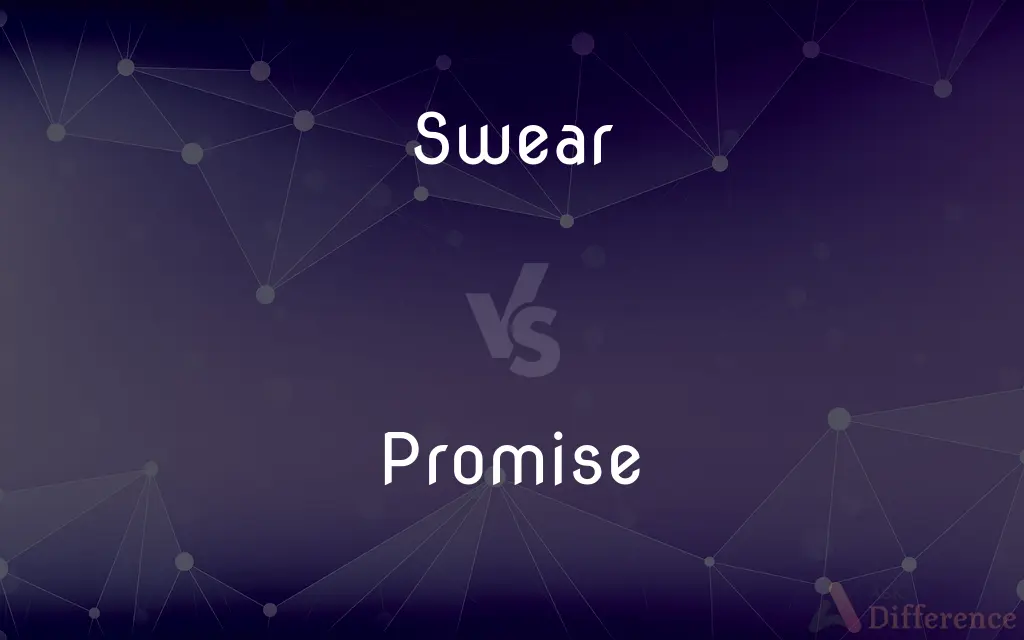Swear vs. Promise — What's the Difference?
By Fiza Rafique & Urooj Arif — Updated on April 4, 2024
Swearing involves a solemn declaration, often invoking a deity, while promising is a commitment or assurance without such invocation.

Difference Between Swear and Promise
Table of Contents
ADVERTISEMENT
Key Differences
Swearing is a form of vow or oath that is often more solemn and may involve invoking a deity or a sacred entity as a witness to the declaration. It is usually associated with serious commitments or legal proceedings, emphasizing the gravity and sincerity of the individual's intent. Promising, on the other hand, is a declaration or assurance that one will do something or that a particular thing will happen. Promises can be formal or informal and do not necessarily invoke a higher power or sacred entity.
When someone swears, they are usually under a higher level of obligation or scrutiny, given the serious nature of invoking a deity or sacred principle. This can be seen in legal contexts, such as when taking an oath in court, where swearing to tell the truth under penalty of perjury highlights the serious consequences of lying. Promises, while also important and binding to one's word, typically carry a more personal rather than legal obligation. Breaking a promise can lead to a loss of trust and personal disappointment, but not usually legal repercussions.
The act of swearing has a long historical and cultural significance, often tied to religious or spiritual beliefs, where breaking such a vow could result in divine retribution or loss of honor. Promising, although it can be deeply personal and morally binding, lacks this historical weight of potential spiritual or divine consequence. However, in many cultures, keeping one’s word, whether by a swear or a promise, is a matter of personal honor and integrity.
In terms of usage, swearing can also refer to the use of profanity or curse words, which is a completely different context from making a solemn vow. This dual meaning does not apply to promising, which maintains a consistent association with making commitments or assurances.
The choice between swearing and promising may depend on the context and the seriousness of the commitment being made. While both acts bind an individual to their word, swearing is typically reserved for situations requiring an extra layer of solemnity and formal recognition, whereas promising is more versatile, covering a wide range of personal and informal commitments.
ADVERTISEMENT
Comparison Chart
Nature
Solemn declaration, often invoking a deity or sacred entity.
Commitment or assurance without invoking a higher power.
Obligation
Higher, with potential legal or divine consequences.
Personal, with social or interpersonal consequences.
Context
Often used in legal, religious, or very formal settings.
Can be formal or informal, personal or professional.
Historical Significance
Tied to religious or spiritual beliefs, with serious repercussions for breaking.
Less about divine retribution, more focused on personal integrity.
Alternative Meaning
Can also mean the use of profanity.
Consistently associated with the act of making a commitment.
Compare with Definitions
Swear
A solemn oath, often invoking a deity.
He swore to uphold the laws.
Promise
Focuses on personal integrity and trust.
She broke her promise, losing their trust.
Swear
Used in serious or legal contexts.
She swore an oath of allegiance.
Promise
A commitment to do something or assurance.
He promised to return the book.
Swear
Sometimes means using profane language.
He was cautioned for swearing in public.
Promise
Consistently linked to the act of committing.
They made a promise to support each other.
Swear
Can involve serious legal repercussions if broken.
Swearing falsely under oath is perjury.
Promise
Can be made in both personal and professional contexts.
The company promised to improve its services.
Swear
Carries a heavier sense of duty and consequence.
They swore to protect the secrets.
Promise
Breaking it leads mainly to social consequences.
Failing to keep a promise damaged his reputation.
Swear
Make a solemn statement or promise undertaking to do something or affirming that something is the case
Maria made me swear I would never tell anyone
‘Never again,’ she swore, ‘will I be short of money’
I swear by all I hold dear that I had nothing to do with it
They were reluctant to swear allegiance
Promise
A promise is a commitment by someone to do or not do something. As a noun promise means a declaration assuring that one will or will not do something.
Swear
Use offensive language, especially as an expression of anger
Peter swore under his breath
Promise
A declaration or assurance that one will do something or that a particular thing will happen
I did not keep my promise to go home early
What happened to all those firm promises of support?
Swear
To make a solemn declaration, invoking a deity or a sacred person or thing, in confirmation of and witness to the honesty or truth of such a declaration.
Promise
The quality of potential excellence
He showed great promise even as a junior officer
Swear
To make a solemn promise; vow.
Promise
Assure someone that one will definitely do something or that something will happen
She made him promise that he wouldn't do it again
He promised to forward my mail
He promised her the job
‘I'll bring it straight back,’ she promised
Swear
To use obscene or blasphemous language; curse.
Promise
Give good grounds for expecting (a particular occurrence)
It promised to be a night that all would remember
Forthcoming concerts promise a feast of music
Swear
(Law) To commit oneself by oath to giving evidence or testimony that is truthful.
Promise
A declaration assuring that one will or will not do something; a vow.
Swear
To declare or affirm solemnly by invoking a deity or a sacred person or thing
Swore on the Bible that he would tell the truth.
Promise
Something promised.
Swear
To say or affirm earnestly and with great conviction
I swear that I will pay you back.
Promise
Indication of something favorable to come; expectation
A promise of spring in the air.
Swear
To promise or pledge with a solemn oath; vow
He swore to do his duty.
Promise
Indication of future excellence or success
A player of great promise.
Swear
To utter or bind oneself to (an oath).
Promise
To commit oneself by a promise to do or give; pledge
Left but promised to return.
Swear
(Law) To administer a legal oath to
All the witnesses have been sworn.
Promise
To afford a basis for expecting
Thunderclouds that promise rain.
Swear
A swearword.
Promise
To make a declaration assuring that something will or will not be done.
Swear
(ambitransitive) To take an oath, to promise intensely, solemnly, and/or with legally binding effect.
The knight swore not to return to the palace until he had found the treasure.
Promise
To afford a basis for expectation
An enterprise that promises well.
Swear
(transitive) To take an oath that an assertion is true.
The witness swore that the person she had seen running out of the bank was a foot shorter than the accused.
Promise
(countable) an oath or affirmation; a vow
If I make a promise, I always stick to it;
He broke his promise
Swear
(transitive) To promise intensely that something is true; to strongly assert.
I swear I don't know what you're talking about.
My little brother is such a pest, I swear.
Promise
(countable) A transaction between two persons whereby the first person undertakes in the future to render some service or gift to the second person or devotes something valuable now and here to his use.
Swear
(transitive) To administer an oath to (a person).
Let the witness be sworn.
Promise
(uncountable) Reason to expect improvement or success; potential.
She shows great promise as an actress.
Swear
(ambitransitive) To use offensive, profane, or obscene language.
Promise
A placeholder object representing the eventual result of an asynchronous operation.
Swear
To be lazy; rest for a short while during working hours.
Promise
Bestowal or fulfillment of what is promised
Swear
A swear word.
Promise
(ambitransitive) To commit to (some action or outcome), or to assure (a person) of such commitment; to make an oath or vow.
If you promise not to tell anyone, I will let you have this cake for free.
She promised to never return to this town again.
He promised me a big kiss if I would drive him to the airport.
I can't promise success, but I'll do the best I can.
Swear
A lazy time; a short rest during working hours (especially field labour); a siesta.
Promise
(intransitive) To give grounds for expectation, especially of something good.
The clouds promise rain.
Swear
Heavy.
Promise
In general, a declaration, written or verbal, made by one person to another, which binds the person who makes it to do, or to forbear to do, a specified act; a declaration which gives to the person to whom it is made a right to expect or to claim the performance or forbearance of a specified act.
For if the inheritance be of the law, it is no more of promise: but God gave it to Abraham by promise.
Swear
Top-heavy; too high.
Promise
An engagement by one person to another, either in words or in writing, but properly not under seal, for the performance or nonperformance of some particular thing. The word promise is used to denote the mere engagement of a person, without regard to the consideration for it, or the corresponding duty of the party to whom it is made.
Swear
Dull; lazy; slow.
Promise
That which causes hope, expectation, or assurance; especially, that which affords expectation of future distinction; as, a youth of great promise.
My native country was full of youthful promise.
Swear
Reluctant; unwilling.
Promise
Bestowal, fulfillment, or grant of what is promised.
He . . . commanded them that they should not depart from Jerusalem, but wait for the promise of the Father.
Swear
Niggardly.
Promise
To engage to do, give, make, or to refrain from doing, giving, or making, or the like; to covenant; to engage; as, to promise a visit; to promise a cessation of hostilities; to promise the payment of money.
Swear
To affirm or utter a solemn declaration, with an appeal to God for the truth of what is affirmed; to make a promise, threat, or resolve on oath; also, to affirm solemnly by some sacred object, or one regarded as sacred, as the Bible, the Koran, etc.
Ye shall swear by my name falsely.
I swear by all the Roman gods.
Promise
To afford reason to expect; to cause hope or assurance of; as, the clouds promise rain.
Swear
To give evidence on oath; as, to swear to the truth of a statement; he swore against the prisoner.
Promise
To make declaration of or give assurance of, as some benefit to be conferred; to pledge or engage to bestow; as, the proprietors promised large tracts of land; the city promised a reward.
I dare promise myself you will attest the truth of all I have advanced.
Swear
To make an appeal to God in an irreverant manner; to use the name of God or sacred things profanely; to call upon God in imprecation; to curse.
[I] swore little; diced not above seven times a week.
Promise
To give assurance by a promise, or binding declaration.
Swear
To utter or affirm with a solemn appeal to God for the truth of the declaration; to make (a promise, threat, or resolve) under oath.
Swear unto me here by God, that thou wilt not deal falsely with me.
He swore consent to your succession.
Promise
To afford hopes or expectation; to give ground to expect good; rarely, to give reason to expect evil.
Will not the ladies be afeard of the lion?I fear it, I promise you.
Swear
To put to an oath; to cause to take an oath; to administer an oath to; - ofetn followed by in or into; as, to swear witnesses; to swear a jury; to swear in an officer; he was sworn into office.
Promise
A verbal commitment by one person to another agreeing to do (or not to do) something in the future
Swear
To declare or charge upon oath; as, he swore treason against his friend.
Promise
Grounds for feeling hopeful about the future;
There is little or no promise that he will recover
Swear
To appeal to by an oath.
Now, by Apollo, king,Thou swear'st thy gods in vain.
Promise
Make a promise or commitment
Swear
Utter obscenities or profanities;
The drunken men were cursing loudly in the street
Promise
Promise to undertake or give;
I promise you my best effort
Swear
To declare or affirm solemnly and formally as true;
Before God I swear I am innocent
Promise
Make a prediction about; tell in advance;
Call the outcome of an election
Swear
Promise solemnly; take an oath
Promise
Give grounds for expectations;
The new results were promising
The results promised fame and glory
Swear
Make a deposition; declare under oath
Swear
Have confidence or faith in;
We can trust in God
Rely on your friends
Bank on your good education
I swear by my grandmother's recipes
Common Curiosities
Do both swearing and promising require truthfulness?
Both acts require the individual to be truthful and sincere in their declaration.
Is promising less serious than swearing?
Promising is seen as less formal and usually lacks legal consequences, but it is still serious on a personal level.
Can swearing have legal implications?
Yes, swearing, especially under oath, can have legal implications such as perjury charges.
Can a promise have consequences if broken?
While not usually legal, breaking a promise can lead to loss of trust and personal disappointment.
Can someone swear without invoking a deity?
While traditionally involving a deity, modern contexts allow for secular oaths that still carry a solemn promise.
Is it possible to take back a swear or a promise?
Ethically, both should be considered binding, but circumstances may allow for renegotiation or release from the commitment.
What is the difference between swearing and promising?
Swearing is a solemn vow, often invoking a deity, while promising is a commitment without such invocation.
Why might someone choose to swear rather than promise?
Swearing might be chosen for its added solemnity and the seriousness it conveys, especially in formal or legal contexts.
Are there cultural differences in how swearing and promising are viewed?
Yes, cultural and religious beliefs can influence the perceived seriousness and implications of swearing versus promising.
How is trust affected by breaking a swear or a promise?
Trust can be significantly damaged by breaking either, with the severity often depending on the context and expectations.
Share Your Discovery

Previous Comparison
Bend vs. Bent
Next Comparison
Priory vs. FriaryAuthor Spotlight
Written by
Fiza RafiqueFiza Rafique is a skilled content writer at AskDifference.com, where she meticulously refines and enhances written pieces. Drawing from her vast editorial expertise, Fiza ensures clarity, accuracy, and precision in every article. Passionate about language, she continually seeks to elevate the quality of content for readers worldwide.
Co-written by
Urooj ArifUrooj is a skilled content writer at Ask Difference, known for her exceptional ability to simplify complex topics into engaging and informative content. With a passion for research and a flair for clear, concise writing, she consistently delivers articles that resonate with our diverse audience.















































